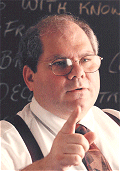
|
QW2001 Paper 4M2 Dr. Cem Kaner Managing The Proportion Of Testers To Developers |
|
This talk summarizes ideas surfaced in a working meeting of the Software Test Managers Roundtable. We asked how to decide, for a given project, what is the best ratio of testers to other developers.That ratio is sometimes 1-to-1, and 1-to-1 can foster close relationships in paired tester-to-programmer teams. But many of us at the meeting reported that our most successful projects had a much lower proportion of testers and that some of our least successful projects had much higher proportions of testers.
We start by asking what it means to say there is a 1-to-1 ratio. It turns out that different people have entirely different ways of calculating this. Many of the comparisons that we've seen are between apples and alligators.
From there, we look at some of the workload factors that favor high numbers or low numbers of testers. For example, a product that has lots of bugs needs lots of testers. A project team that invests heavily in early analysis and design will probably need less tail-end testing. As a different class of example, a project that relies heavily on external configurations and components that are outside of the control of the local project team will need extensive testing. Project-specific factors will drive you toward different ratios, and toward different ratios at different times in the project.
The associated paper lists and explains a wide range of factors and suggests some collaborative methods that you might use to staff appropriately for your particular situation.
Cem Kaner is Professor of Computer Sciences at the Florida Institute of Technology.Prior to joining Florida Tech, Kaner worked in Silicon Valley for 17 years, doing and managing programming, user interface design, testing, and user documentation. He is the senior author (with Jack Falk and Hung Quoc Nguyen) of TESTING COMPUTER SOFTWARE (2nd Edition) and (with David Pels) of BAD SOFTWARE: WHAT TO DO WHEN SOFTWARE FAILS.
Through his consulting firm, KANER.COM, he teaches courses on black box software testing and consults to software publishers on software testing, documentation, and development management.
Kaner is also the co-founder and co-host of the Los Altos Workshop on Software Testing, the Software Test Managers' RoundTable, the Workshop on Heuristic & Exploratory Techniques, and the Florida Workshops on Model-Based Testing.
Kaner is also attorney whose practice is focused on the law of software quality. He is active (as an advocate for customers, authors, and small development shops) in several legislative drafting efforts involving software licensing, software quality regulation, and electronic commerce.
Kaner holds a B.A. in Arts & Sciences (Math, Philosophy), a Ph.D. in Experimental Psychology (Human Perception & Performance: Psychophysics), and a J.D. (law degree). He is Certified in Quality Engineering by the American Society for Quality.